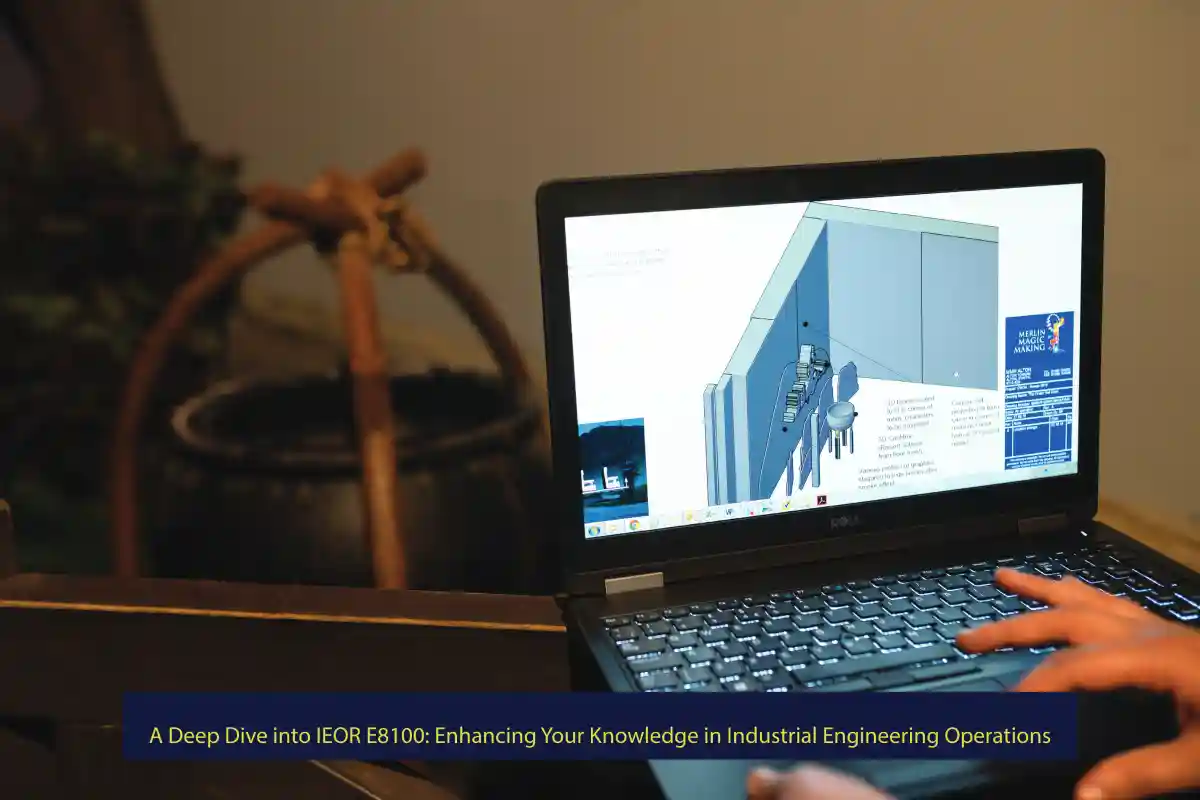Table of Contents
Introduction to IEOR E8100
The IEOR E8100 course represents a fundamental cornerstone in the circle field of Industrial Engineering Operations, intended for anyone who wants to come to know this essential area. This postgraduate class is mainly oriented to the interactions of engineering and business processes. It aims to provide the time-essential analytical and decision-making tools to study and enhance complicated systems. As industries become competitive and engage progressively sophisticated systems, knowledge in IEOR E8100 becomes highly significant for making operations effective and efficient.

Core Concepts and Theoretical Frameworks
Optimization Essentials
In this connection, the IEOR E8100 course is vital for students who aim to gain general knowledge about Industrial Engineering and Operations Research. Below are some of the basic tenets that form this curriculum’s foundation and advance practical applications across different industrial areas. One of the core topics, optimization, starts with finding the best value for decision-making criteria. Optimization was a critical process within operations since it was directly related to resource allocation, production planning, and operational efficiency.
Data-Driven Decisions
Statistics also constitutes a final central pillar of the IEOR E8100 framework. As part of the knowledge gathered in the discipline, students understand how to use data to make decisions on changes in operations in industries. Evaluating patterns and trends indicates professionals’ expectations of the demand and helps to enhance efficiency and reduce unnecessary loss of resources. That statistical base enables industrial engineers to decide based on data, which is missing in today’s world, the age of big data. Using statistical tools alongside optimization procedures points to the key competencies functional in present-day industrial engineering.
Analytical Decision-Making
Operations research, a discipline that uses analytical tools for improved decision-making, is also the foundation of the IEOR E8100 curriculum. In applying mathematical models, simulations, and algorithms, students can solve issues that can confront most industries today, like supply chain management, scheduling, and inventory control. Besides, the frameworks developed within the field of operations research enable the translation of the discussed theory into practice, thus proving the application of ideas in practice. The learners can practically see that these theoretical models boost efficiency through case studies and real-life examples.
In summary, integrating optimization, statistics, and operations research into the content of the IEOR E8100 course not only enhances the appreciation of industrial systems but, more importantly, offers tools for decision-making and improving efficiency in practical problem-solving endeavors.
Applications in Real-World Scenarios
Lean and Six Sigma Applications
All the concepts taught in IEOR E8100 help solve some issues affecting different industries. Industrial engineering operations involve planning, organizing, and improving operation processes and productivity management. One can be as follows: In the manufacturing industry, specific organizations adopt lean strategies and Six Sigma methods to curtail useless spending on their processes. For example, in the case of Case Study A, implementing these principles for a manufacturing company reduced production time by 25% and an Operational Cost Saving of 15%.
Healthcare Efficiency Improvements
Industrial engineering principles also add value to the operations of the healthcare sector. The following are some examples. This paper aims to identify specific difficulties encountered in managing patient throughput at hospitals. Using quantitative methods learned in IEOR E8100, healthcare facilities can run more efficiently. Another example is that a hospital’s simulation models helped to enhance the operational performance of their emergency and active patient throughput, which increased by 30%, with overall patient wait times decreasing. The improvements provide a way to acquire higher quality services in delivering patient service and yield positive results in treating patients.
Supply Chain Optimization”
The retail industry has benefited similarly from the scenario insights created out of IEOR E8100. By understanding inventories and providing solutions with supply chain management, retailers can limit their supplies to avoid stock changes. For example, applying the cost analysis approaches in work on a significant retail chain, the company successively optimized the inventory regulation, receiving a 20 percent outcome in terms of productivity growth and reduced hold costs.
These case analyses make an excellent case for comprehending and applying IEOR E8100 principles in other arenas in the real world. With an understanding of a wide range of industries and organizations, I can substantially impact systems transformation, increase efficiency, cut costs, and optimize resource utilization.
Conclusion
In this paper, the importance of the IEOR E8100 course has been revealed within the context of industrial engineering operations. Besides offering a fundamental knowledge of concepts like system optimization and decision-making, the curriculum gives hope for the university by preparing its aspiring industrial engineers to remain relevant in today’s employment market by imparting practical skills. As a result of going through the content provided in IEOR E8100, students can equip themselves for different experiences they will likely encounter in their careers.
FAQs
What are the prerequisites for enrolling in IEOR E8100?
Normally, students are required to possess a basic knowledge of mathematics and statistics that is useful in providing a basis for the analytical methods in the course. Some underpinning knowledge of engineering concepts might also improve the learning process.
What potential career paths can I pursue after completing IEOR E8100?
The following career opportunities await IEOR E8100 graduates: Operations management, supply chain analysis, and system engineering. Several skills developed in this course can lead to employment across various sectors, including production and electronics.
What tips do you have for success in IEOR E8100?
Class discussions and group work also help enhance one’s learning and make information easily retained in one’s brain. This is also good advice or strategy to opt for practical or applied works or projects, as well as case studies that call for using concepts and theories learned.






